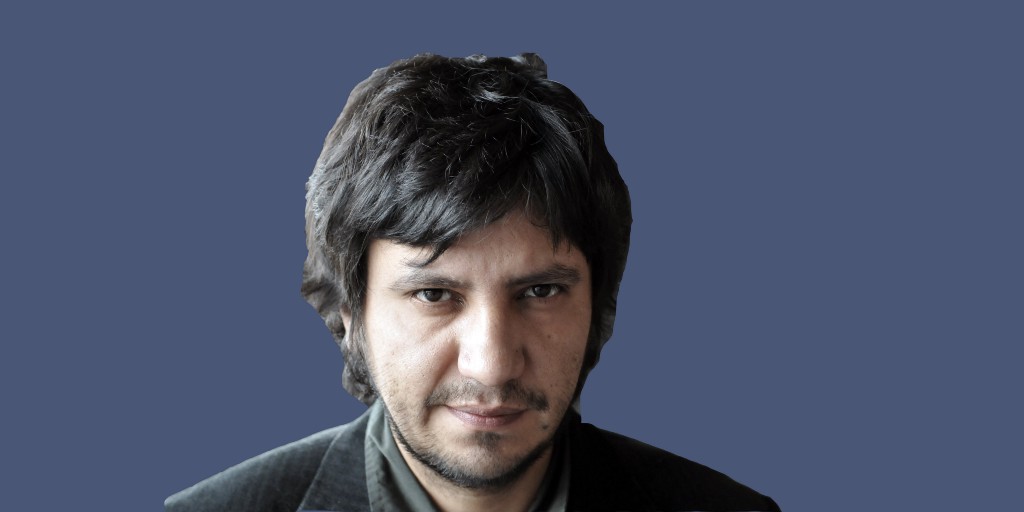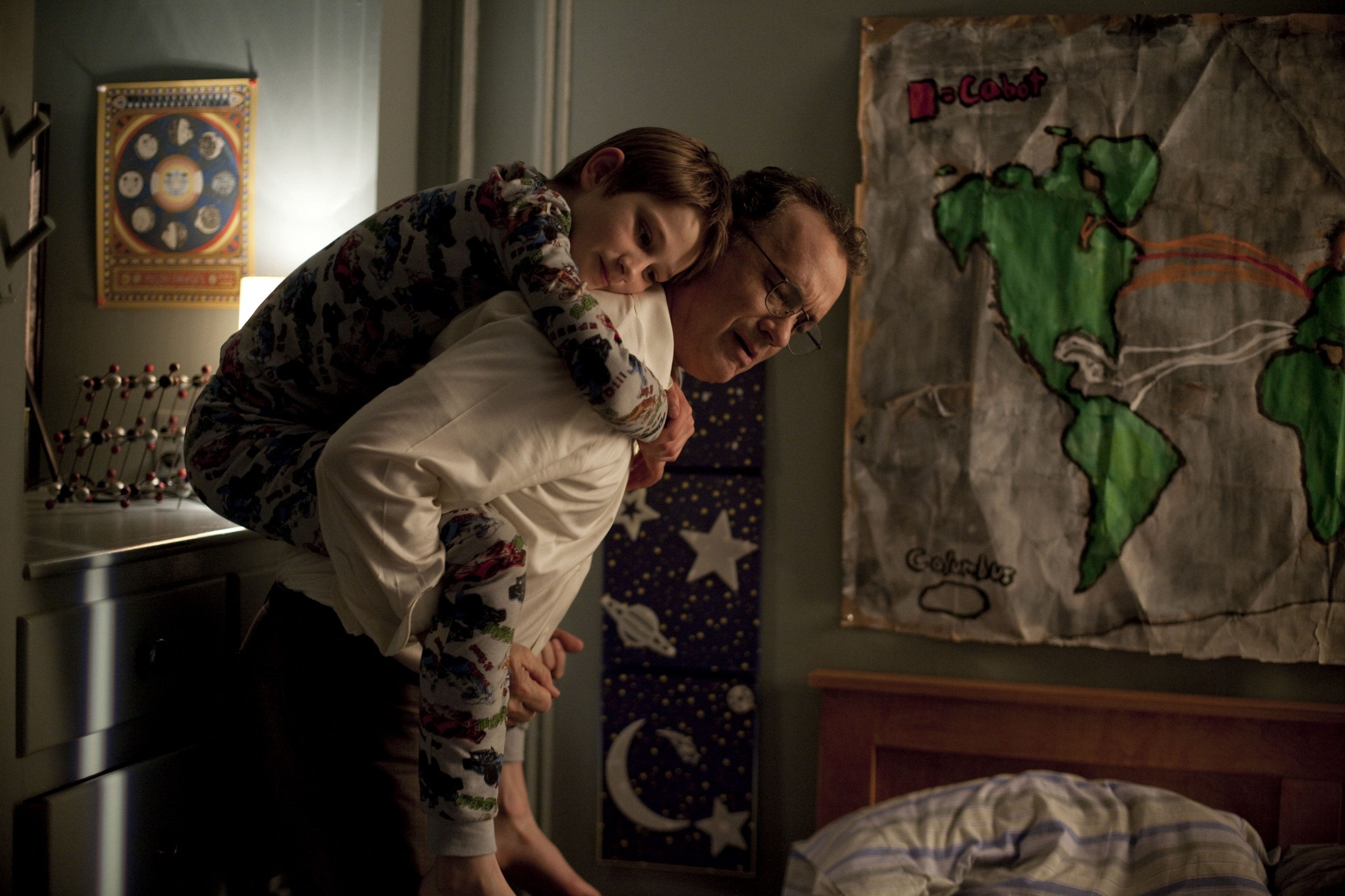Interviews
My Missing Document: A Lost Interview with Alejandro Zambra
by Rebecca Schiff

When you’re a fan of someone’s writing, or feel connected to it, you always hope that you will like the writer in person. I liked Alejandro Zambra a lot. He was funny and loquacious, an easy person to interview. He ate a cookie and got crumbs in his hair.
We decided to leave the coffee shop so he could smoke. But there were too many children in the park next door. We saw a public school with a bench outside, and thought that would be a fitting place to talk about the repressiveness of school, a theme in his new book, Multiple Choice. Some mothers on a nearby bench asked if we were parents of any children in the school. We were not, we admitted. They told us we had to leave.
“We don’t look like parents,” said Zambra.

How had Multiple Choice come about? Zambra had thrown out the first fifty pages of a more traditional novel he was trying to write about 1993. The process had been making him feel like a “fucking author,” like he was writing a book he should be writing. I knew what he meant. Anything that felt like a “should” was death to the mysterious thing that makes writing good. The answer lay in finding a form that would allow the story to be told spontaneously. For Zambra, the form came from the Chilean Academic Aptitude Test, a standardized test he’d taken in 1993. At the time, the CAAT determined the futures of Chilean high school students, and caused a great deal of stress to teenagers. Zambra had structured his book like the verbal sections of the test, with headings like “Sentence Order” and “Reading Comprehension.”
“At first,” he said, “writing the questions was pure parody and joy, like imitating voices of people, but later I understood it also as making fun of myself and trying to find out how those structures stayed inside me.”
Zambra added that one could read Multiple Choice without prior knowledge of literary genres, and that he hoped the book would reach people who hadn’t had a literary education.
Writers who grow up under dictatorship have a true interest in democratizing literature, I noted. Writers who grow up under democracy have a true interest in remaining snotheads.
I kept pushing the question of how agents or publishers let him get away with such a low page count (Zambra’s novels are poetic and self-contained, minimalist in that they convey a lot of emotion with only a few details), but Zambra hadn’t had an agent at first and insisted that the Chilean literary world isn’t as market-oriented as the North American one. Zambra’s first novel, the recursive and heartbreaking Bonsai, came out of his interest in bonsai, how they needed to be tended, but also restricted. They were a little creepy, we decided. Zambra said the voices in Bonsai started to come to him as he wrote, that he wasn’t even thinking of the book as a novel.
I wasn’t exactly listening. I held my phone between us to record his answers while we walked to a bookstore. We sat on a bench outside the store and nobody bothered us because we looked like writers. At least Zambra did. Zambra had started out writing poetry, was “raised as a poet.” His first poems were “highly compressed stories, written in free verse.” I told him I liked Chilean poetry. I especially liked “the guy who wrote the poems about Claudia” and “the guy who lived on the beach.”
“Bertoni,” he said, “Claudio Bertoni. Maybe it’s the same guy writing poems about himself. Which he does.”
“My memory is kind of bad,” I said.
“Nicanor Parra lives on the beach, too. He’s going to be a hundred and two soon.”
“You like Parra?”
“A lot. He and Gabriela Mistral and Gonzalo Millán and Enrique Lihn are…”
“That’s the guy who wrote about Claudia, Enrique Lihn.”
“Oh yes! I wouldn’t identify him that way, but yes. Your memory is not bad.”

He mentioned Emily Dickinson, too, and I nodded even though I can never remember any of her poems besides “There’s a certain slant of light…” We talked about his excellent English translator Megan McDowell, and what it was like living in the U.S. for a year (Zambra had just finished a year-long fellowship at the New York Public Library). I asked how it affected him to speak a different language than the one he was raised with.
“It’s funny, I think at first I stupidly tried to be someone else. Making yourself up in a different light, it’s a great opportunity. Do you speak Spanish?”
“Only in the present tense.”
We talked more about Multiple Choice. He showed me a question in the Sentence Completion section that was a famous quote from Pinochet that I hadn’t realized was a famous quote from Pinochet. The section also had a quote from the New Testament that I hadn’t realized was a quote from the New Testament. How could I understand Chilean literature if I hadn’t been exposed to the hypocrisy of its dictator? How could I understand any literature if I had never read the New Testament?
I will get home and transcribe these notes, I thought. I will learn more about Pinochet and Jesus. I will nap. But when I got home, I realized that I hadn’t pressed “save” on the hour-long voice memo I had recorded of us talking. I had been so caught up in the moment, in the present tense, that I had forgotten to be mindful about technology. And now it was gone. This felt very Latin American, like it raised unanswerable questions about memory and loss, disappearance, erasure, but mostly it felt like a giant pain in the ass. It turns out that I only remembered what I’d said, that I’d talked a lot about my ex-boyfriend, also Chilean, very much alive, but gone to me. Actually, the ex was still my friend. He’d written a few questions for Zambra, better questions than mine, questions about “the literature of the children” (Chileans who’d been kids during the dictatorship) and the author’s thoughts about the relationship between books and film. I hadn’t gotten to those questions. I had asked some okay questions and Zambra had given me poetic answers that I’d never be able to recreate.

All I remembered was that he’d talked about housesitting. He’d quoted Ezra Pound. He told me a joke about the narcissism of writers and I’d missed the punch line because I’d been thinking about myself. I remembered that the sky had started out clear, then clouded over. Zambra had bought my book in the bookstore. Zambra had finished my green tea.
“I should be interviewing you,” he said. We’re all trying to be humble, I thought. I’ve been interviewed a lot this past month, and I always ask the interviewer if they write fiction. (They always do.)
“You should ask me the questions you hate being asked in interviews,” Zambra had said before the interview started. “As revenge on those interviewing you.”
“What do you hate?” I asked.
“Ask me what is autobiographical, about the line between fiction and nonfiction.”
We chuckled. The interview is a silly form, I thought, until the interview I had recorded was gone. Then I realized that the interview is a wonderful form. Writers, who spend a lot of time perfecting what they present to the world, get to chat about themselves and their work. The interviewer, if she’s lucky, gets to go home and type up somebody else’s words. The magazine runs a piece. Now I had to write something postmodern, an interview without an interview, a story Alejandro Zambra was born to write, but that I would probably bungle. I cried to my new boyfriend on the phone.
“Just write down what you remember,” he said. “Do it before you forget.”
“I don’t want to write anything down. I want to press play and write down what Zambra said.”
“That’s no longer a possibility,” he said.
I went on Apple’s discussion boards. People had lost 48 minutes, 25 minutes, their children’s recitals, recordings they desperately wanted back. If the person recording had only pressed pause and then closed the app without pressing save, she was screwed. The boards were unequivocal about this. I thought about Nixon. 18 minutes. My iPhone had failed me, had failed literature. I could email Zambra questions, or meet with him again, but the spontaneity of the initial conversation couldn’t be recreated. Maybe nobody should record conversations, I thought. Maybe they’re supposed to be fleeting. Maybe in capturing a moment between two people, we destroy the moment’s essence.
I didn’t believe this at all. I thought about the Buddhists who spend years making sand art, then sweep it away. I’ve always felt bad for those guys. I photograph sunsets. I back up my files. I use the Cloud, an external hard drive, Google Docs, DropBox. I haven’t lost much, at least not documents. Emily Dickinson may have had a poem about losing things. No, it’s Elizabeth Bishop. It’s the poem they make you explicate in school, sometimes on standardized tests.
The author thinks losing things is:
a) a disaster
b) no disaster
c) fine, as long as you have a good memory
d) a glitch Apple should fix in the next generation of iPhone
Bishop’s next to Zambra on my bookshelf, where fiction ends and poetry begins.
Rebecca Schiff is the author of The Bed Moved (Knopf, 2016). Her stories have appeared in Electric Literature’s Recommended Reading, n+1, The American Reader, Fence, and Guernica. She lives in Brooklyn.









